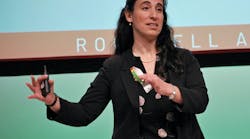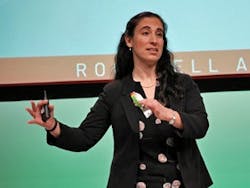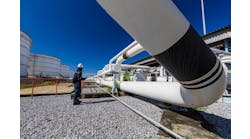“Improved nutrition has one of the best ROIs you will ever see.” Edesia’s Maria Kasparian explained how automation has transformed the nonprofit’s abilities at Rockwell Automation’s Perspectives media event in Chicago.
Advanced manufacturing and not-for-profit are two terms you don’t often hear together.
“But that’s what we’re doing,” explained Maria Kasparian, executive director of Edesia, a Rhode Island-based nonprofit that combats malnutrition around the globe. And by approaching its altruistic mission like a manufacturer—a modern, smart, digitally enabled manufacturer—it is optimizing its efforts.
The ROI? Millions of lives saved.
During her presentation “Modernizing Technology to Save More Lives,” delivered to a rapt audience at Rockwell Automation’s Perspectives media event at Automation Fair, Kasparian provided the backstory to Edesia—launched in 2010 and partnering with the likes of UNICEF and the U.S. government with the goal of eradicating starvation in the world’s most vulnerable cultures.
The approach is comprehensive—from engaging with domestic farmers for the ingredients to produce their nutrient-dense food products, to constant research-and-development efforts to quicken distribution, to educational efforts aimed at raising awareness and funds.
All noble stuff, but what really resonated with this audience was the description of efforts Edesia launched four years ago to fully embrace digitalization and supercharge the good work.
In short, embracing a data-driven approach. Sound familiar, manufacturers?
Data and more specifically numbers are now central to Edesia’s operations. Kasparian delivered some sobering figures to highlight the problem—3 million preventable deaths each year as a result of malnutrition. But she also noted encouraging statistics—the one-box-of-food-saves-one-kid ratio, the 10 million children Edesia has saved since launching less than a decade ago. And in the parlance of a profit-driven manufacturer, the executive director broke it all down to return on investment—dollars and cents.
“Improved nutrition has one of the best ROIs you will ever see,” she boasted. “Every dollar spent on basic nutritional needs has a return of $16 on the local economy.”
Great need, big wins
After six years of success, albeit relying on less-than-fully efficient approaches, Edesia made “huge upgrades” in 2016, scaling production, expanding the size of its factory from 15,000 sq ft to 85,000, and aggressively automating processes that resulted in growth of annual output from 9,000 metric tons of food to 25,000.
“We went from very manual processes to state-of-the-art, automated processes,” she explained. One example: while workers had previously dumped 50-lb bags into mixers, one-ton bags are now loaded into sophisticated dosing hoppers. “And with our new production equipment we started using Rockwell Automation’s PlantPAx DCS for batch-process control.”
Efficiency increases were quickly realized in addition to side benefits. Edesia has enjoyed a further 20% increase in capacity in 2019 alone. That’s a huge win, particularly considering that success like that means more than just increased earnings for shareholders, but rather more children fed and more lives saved. Rather than replacing the 105 workers, many of whom are refugees from the countries the nonprofit serves, this automation upgrade was, in Kasparian’s words, a game changer. Personnel embraced the new technologies. Workers learned new skills. Pay increased, along with job satisfaction.
The smart approach at the nonprofit continues to evolve. In the past 12 months Edesia has optimized new systems with data provided from machines. Employing donated software licenses from Rockwell Automation, real-time data is now displayed throughout the factory, enabling constant access by staff, which can make immediate, informed decisions on the fly.
Said Kasparian, “These innovations have helped us lower the cost of our humanitarian processes. This means reaching more children. We thank Rockwell Automation for its support and partnership. May we together continue to find ways to do more, to build a world where all children are well-nourished.”
Heart optimized by smarts
One of the misconceptions about automation is that it undermines the human element of manufacturing. It removes man and woman from the work. This is a fallacy, of course. Just look at the improved conditions for workers in the Edesia facility as an example.
But this case study presented today is a particularly human one, a particularly warm example of using advanced manufacturing to prompt true, positive change.
During his keynote presentation, Rockwell Automation Chairman and CEO Blake Moret celebrated the special relationship Rockwell Automation has with its partners. None is likely as inspirational as this union with Edesia, which Moret described as “a truly remarkable organization.”
The results surely are remarkable. So is the overarching strategy—a nonprofit driven by the progressive mindset of a digitally transformative manufacturer. Heart, optimized by smarts, filling bellies around the globe.





